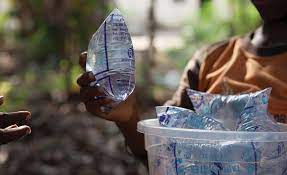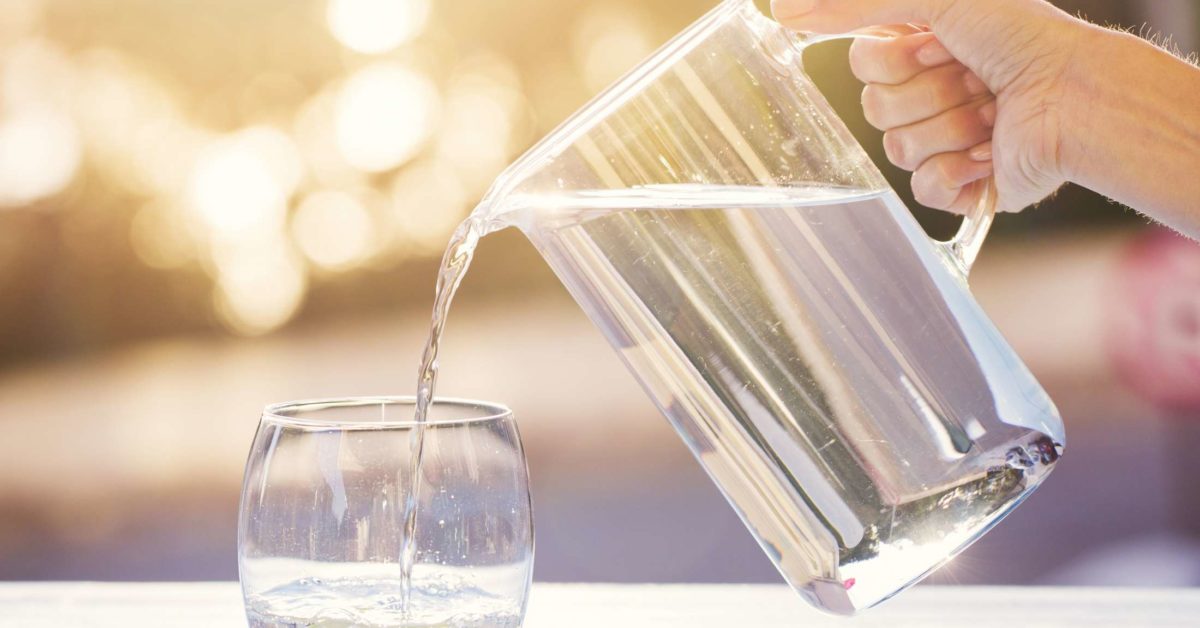By Dakuku Peterside
The sachet water, commonly known as ‘Pure Water’ all over Nigeria, is the most popular source of drinking water in most cities and villages. Last week, reports emerged that the price of a sachet of water has jumped from N10 to N20. The doubling of the cost of sachet water is very symbolic. Over the years, as inflation made the mess of the value of the Naira and the spending power of Nigerians, the sachet water had held firm.
As the saying goes, ‘water is life’. Biologically, water is essential to the human body. Every one of our cells, organs, and tissues use water to help with temperature regulation, keep hydrated, and maintain bodily functions. Besides, water acts as a lubricant and cushions our joints. Drinking water is excellent for your overall health. And it is not a luxury but primarily a need. The desire for water is not like a craving for sweets, chewing gums or alcohol. It is as essential as eating food and it is also vital while eating food.Scientifically, 60% of the human body is made up of water. While the brain and heart are 73%water, the lungs are about 83% water.
These may explain why the price of water has been relatively inelastic. The cost of sachet water held firm while other goods caved to inflation, perhaps because of the catastrophic consequences of this critical item becoming unaffordable to most Nigerians. Now the price of ‘Pure Water’ has finally doubled. This issue is a severe problem for the Nigerian masses and symptomatic of Nigeria’s economic crisis. It is no longer a point of argument that hardship has overtaken the land .
According to official statistics, Nigerian inflation hit a four-year peak in February as food prices jumped to more than 20 per cent, putting enormous financial pressure on households already faced with biting unemployment, weaning purchasing power and a stagnant economy at a time of mounting insecurity.
Inflation in Nigeria has remained in the double digit category since 2016 but seems to have gone berserk since February 2020, probably, driven by the impact of a coronavirus epidemic that has also induced a drop in the price of oil, Nigeria’s main export, and weakened the Naira.
According to the Nigerian Bureau of Statistics (NBS), food prices, which make up the bulk of the inflation basket, rose to 21.79 per cent in February 2021, a jump of 1.22 percentage pointsfrom January 2021. The recent inflation rate was the highest since the 17.78 per cent rate in February 2017.
Further analysis of the recent NBS report makes for dire reading. It states that consumption expenditure of Nigerian households fell in full-year 2020, while that of the government increased during the same period. Disposable income declined in Q4 of 2020. At the time consumption expenditure dwindled among Nigerians, that of government rose by 61.58% in 2020 . A puzzle that is not difficult to explain given the increased debt profile of the country.
Additionally, the report states that on a month-on-month basis, the core sub-index increased by 1.21% in February 2021. This report was down by 0.05% when compared with 1.26% recorded in January 2021. The highest increases were in prices of passenger transport by air, medical services, miscellaneous services relating to the dwelling, hospital services, and passenger transport by road. It also includes pharmaceutical products, paramedical services, repair of furniture, vehicle spare parts, maintenance and repair of personal transport equipment, motor cars, dental services and Hairdressing salons, and personal grooming establishment.
Neither urban areas nor rural areas are exempt from negative inflation. The urban inflation rate increased to 17.92% (year-on- year) in February 2021 from 17.03% recorded in January 2021. The rural inflation rate rose to 16.77% in February 2021 from 15.92% in January 2021.
The Covid-19 Pandemic, spiralling unemployment, shrinking fiscal space, burgeoning external debt (currently estimated at $32 billion), exchange rate volatility, and acute insecurity challenges experienced in the country contribute to the worsening inflationary trend in the country. Nigeria is yet to come out of the impact of last year’s lockdown and severe restrictions owing to the Covid-19 pandemic, which virtually paralysed the economy. Neither has it exited from the severe worldwide economic global implications of a debilitating, once-in-a-lifetime scourge.
Insecurity has taken a toll on agricultural activities, with grave implication on food inflation driving the other indices. The unending Boko Haram insurgency, kidnapping, banditry, and herder-farmer crisis have displaced millions of farmers from their farmlands, making it difficult for them to produce adequate food. The states ravaged by insurgency and banditry have witnessed an ugly situation whereby the displaced farmers now mostly live permanently in Internally Displaced Persons (IDP) camps threatening Nigeria food security.
Most of the North Central geopolitical region states, regarded as the country’s food basket, are currently engulfed in farmer-herder crises and reprisals as well as banditry. From Benue to Plateau to Taraba, Niger and the Kogi States, farmers have abandoned their farmlands out of fear of being kidnapped, maimed, or killed by bandits, herders or other armed criminal elements that have infested the area. Additionally, some unscrupulous elements procure food and stock to create artificial scarcity to increase the prices.
The deplorable state of our roads and multiple tariffs imposed on trucks that convey foodstuffs add to food insecurity, fuel inflation. Bad roads lead to frequent breakdowns of vehicles, constant replacement of vehicle parts and repairs. The transporters naturally shift these costs to the consumers, thereby making the prices of foodstuffs go over the roof.
The alarming inflationary rate in Nigeria is mainly a consequence of the depreciation of the Naira and the concomitant increase in the price of the imported good. Other reasons may include a rapid rise in net import, expansion of public expenditure, rapid growth in money supply and expansionary fiscal policy. There is also the problem of the frequent budgetary deficit.
The Nigerian economy is currently witnessing a decline in the value of money. This results in the ambiguous losses and gains of lenders and borrowers and sellers, and buyers. Furthermore, increasing uncertainty owing to spiralling inflation does not encourage savings and investments, leading to economic decline due to low investment. All said and done , rising inflation is a challenge of economic thinking that requires bold measures to tackle.
As prices of foodstuffs and other essential commodities increase, the long-suffering Nigerian masses are pushed further into the dungeons of poverty and misery, and the gap between the rich and the poor continues to increase. Pensioners and other fixed- income earners are badly affected as the purchasing powers of the Naira are drastically weakened.
These economic pressures have reached alarming rates and require bold emergency actions. Nigerians are going through so much stress and strain with no end in sight. People are angry against society, and some are confused and perplexed. Their anger is unchanneled, unfocussed and has reached an explosive point. One can boldly posit that the killings and violence in Nigeria are expressions of the level of anger and frustration people have.
Violence and anger are now statements to attract attention and satisfy the desire to be heard. Little wonder, non-state actors are popping out everywhere and challenging Nigeria’s sovereignty. Poverty has been weaponised, and ‘stomach infrastructure’ is almost becoming the primary reason for government expenditure as most states in Nigeria spend over 85% of their revenue on recurrent expenditure.
Managers of our economy need to take urgent steps to arrest the alarming inflationary trends and ease the burden on hundreds of millions of Nigerian masses suffering from the current economic malaise. If the tension burst into the streets at the level of pure water consumers we are in real trouble and democracy will be under threat .
The government should block income leakages due to corruption, mismanagement, wastages, and inefficiency in public expenditure while deploying strategic policies to enhance disposable income of Nigerians .
The Central Bank of Nigeria should urgently come up with creative policies to tackle inflation. Control of money supply, policies to increase the competitiveness and efficiency of the economy, putting downward pressure on long-term costs (supply-side policies) and fiscal policies like higher income tax rates could reduce spending, demand, and inflationary pressures.
On the part of Nigerians, from our leaders to the masses, this unique period calls for greater patriotism and sacrifice. It is time to appreciate the depths of our problems, and there should be a realisation that the country currently titters at the brink of disintegration. With rising insecurity, ethnic tensions and tribal clashes, and anomie that permeates Nigeria, further unpatriotic acts may be the unfortunate spark that ignites the flame that may finally consume Nigeria as a corporate entity. The current generation of Nigerians should ensure that we are not the ones that sang ‘Nunc Dimittis’ on a once-great country.
The challenge for leaders is how to protect the masses from worsening inflation and attendant drop in living standards. The leaders should demonstrate accountability, integrity, empathy, and passion demanded by these challenging times. On their part, the masses should eschew all acts capable of worsening an already bad situation. They should strive to be responsible citizens and should not engage in acts capable of sabotaging government efforts to get the country out of the woods.
There is no doubt that poverty bestrides our land. Many people are genuinely suffering. We have returned to the times of hyperinflations, low standard of living, and economic dilemma. Everyone wants solutions to the hydra-headed financial and economic problems. But it is not easy. We have no choice but to come up with solutions before it is too late. A stitch in time saves nine.






